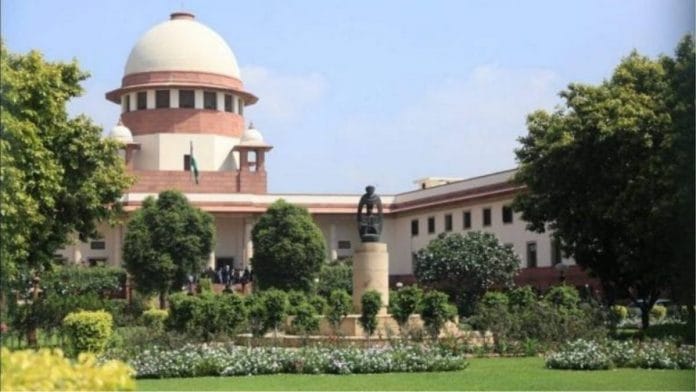New Delhi: A 50-year-old dispute involving the execution of a civil suit for the recovery of Rs 3,000 finally came to an end Tuesday after five rounds of litigation, with the Supreme Court rejecting the petition that sought to prevent the recovery.
The dispute began in 1971 when a woman named Rama Ravi Devi from West Bengal’s Bongaon district filed a civil suit in a munsif court against Sasadhar Biswas for the recovery of Rs 3,000. She won the suit in 1974, and Biswas was asked to pay the amount back in six installments.
However, he was unable to pay it back and Devi filed a petition for the execution of the order, asking for an attachment of Biswas’ property measuring 7,450 sq. ft, equivalent to the amount she was owed. A sale proclamation was then issued in July 1975, which was challenged by Biswas on the ground of material irregularity and fraud.
Biswas’ challenge to the sales proclamation of his property was dismissed in September 1975. Four years later, the plot was put up for auction and two brothers, Sachindra Nath Mukherjee and Dulal Kanti Mukherjee bid the highest on it, offering Rs 5,500 for the land.
What followed was a 50-year-long dispute, carried on by Biswas and subsequently by his legal heirs for a stay on this sale, spanning civil courts, the Patna High Court and eventually the Supreme Court.
At the hearing Tuesday, the SC bench of Justices Hemant Gupta and V. Ramasubramanian remarked the case should become a part of the syllabus in law schools so that students become well equipped with the provisions related to execution of decrees under the civil law.
The persistence with which the petitioner and his legal heirs pursued litigation since 1971 over a “simple money decree” made the court compare him to the “tireless Vikramaditya” from the popular Hindu mythology Vikram Aur Betaal, who made repeated attempts to capture the demon Betaal.
The appeal, court said, arises out of the fifth round of litigation and with the petitioner having exhausted all remedies available to him under the law to “stall the execution”, it added, that this round will hopefully be the final knockout one.
“A judgment debtor cannot be allowed to raise objections as to the method of execution in instalments,” the court said, frowning upon the manner in which the petitioner kept filing petitions.
Also read: Judge who slammed Delhi Police for ‘callous’ probe in Feb 2020 riot cases transferred
Round 1 of litigation
Biswas first filed a petition in June 1979, alleging there was irregularity in the sale proclamation.
A year later, he entered into an agreement with Mukherjee brothers and offered to pay them the “entire money due to them”, in lieu of which the execution decree will be revoked.
But since Biswas paid only Rs 3,700 and not Rs 5,500, on 16 December 1980, the court dismissed his application.
Then four days later, the court suddenly took a U-turn and recalled its order. This review was questioned by the auction purchasers who then filed an application before the court, claiming the recall order was passed in their absence.
When the trial court dismissed their plea in September 1981, the Mukherjee brothers moved the Patna High Court, which in June 1983 remanded the matter back to the trial court for a re-hearing.
Four years later, in 1987, the trial court dismissed Mukherjee brothers’ objection to the recall order.
They moved HC once again, which set aside the 1987 trial court order in December 1990 and confirmed the auction sale.
Biswas then appealed to the Supreme Court in August 1991, and his review against the top court dismissal was also rejected in August 1992.
Rounds 2 to 5
In the second round of litigation, Biswas moved the civil court to declare the auction of the property void. This plea was dismissed in December 1992.
Meanwhile, the auction purchasers applied for a sale certificate but Biswas opposed this too with an application seeking a stay on the execution proceedings.
On 31 January 1994, the civil court gave directions to issue the sale certificate, rejecting Biswas’s claim. Although Biswas approached the HC, his plea was thrown out, seven years after it was filed.
The fourth round of litigation between Biswas and auction purchasers started when the latter applied for possession. Since Biswas had constructed a building during this period, the court ordered its demolition in March 2002.
By this time Biswas’s legal heirs had taken over the litigation and they moved an application to stay the demolition. Both the trial court and the HC refused to entertain their plea against the demolition order but the legal heirs went to the SC and ended up losing their case there in 2006.
The fifth round, which culminated Tuesday, commenced in 2006 when the legal heirs claimed the land auctioned was more than the portion that would satisfy the decree amount, which was Rs 3,300. Based on this, they sought setting aside of the execution decree.
However, upholding the concurrent findings of the two lower courts, SC in its verdict said the legal heirs had sufficient opportunity in the past to raise the objection and the same cannot be allowed now, particularly after having fought four rounds of litigation.
Also read: 19 years after ‘fake encounter’, why SC fined UP govt for shielding policemen from trial






